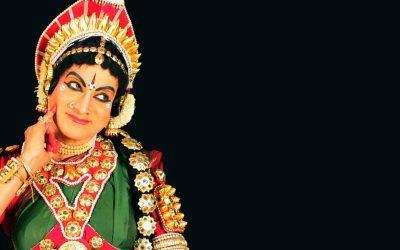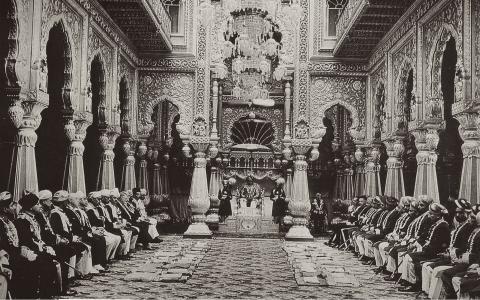April 2022

There, he found a yakṣiṇī, who had a divine charm. She was in the company of her maidens. Śrīdarśana saw that they were carrying varieties of delicacies and drinks; he gathered courage and went to them seeking the share of a guest. One of the women was impressed with his courage and offered food that would suffice for three people. After the three ate their portions of food, Mukhuraka said – “Ārya! You really are a man filled with divine...

Seetharamiah’s Hospitality
In the next week or ten days, I reached Delhi. Seetharamiah was waiting at the train station by the time the train reached. I asked him, “How did you know of my arrival?”
He said, “I got it somehow. You have arrived now, have you not?”
“Why did you come?”
He answered, “To escort you.”
I said, “I was thinking of some other arrangement.”
“Let the other arrangement be kept aside. Please accept this arrangement now...

APPENDIX
‘Deśābhimāni’
One of the most important political situations during Seshadri Iyer’s tenure was related to newspapers. In the city of Mysore, a person by name Srinivas Iyengar was running a Kannada weekly called ‘Deśābhimāni.’ That newspaper often carried anti-government critiques and commentary. I have not seen that newspaper, only heard about it. Apparently, satirical pieces often appeared in it. For example, a conversation between a...

Über-human and sub-human characters do not produce rasa unless they are ‘humanized’ – this is a fundamental tenet of aesthetics. A great poet knows from experience that his work will gain depth only when the characters pass through various trials involving basic human feelings such as love, fury and hatred. Vālmīki and Vyāsa, Kālidāsa’s predecessors, have portrayed their protagonists as human beings through and through. They have succeeded not...
Now, moving on to bhāgavatikè. As mentioned earlier, vācikābhinaya of Yakṣagāna is of three kinds and that rendered by the bhāgavata is a major component.
There is this tradition of singing at a high pitch (tāraka-sthāyi) in Yakṣagāna. It was a result of the needs of a certain period of time and was to serve a specific purpose. Singing at high pitch is strenuous for both the artiste and the listener. The emotion of the padya cannot be captured...

After he cured all of Guṇākara's wounds, Mṛgāṅkadatta continued on his voyage. One night, he was fast asleep under a tree in Vindhyāṭavi. When he was awakened from his sleep, he found that some stranger was asleep amidst them. When the blanket that covered him was removed and his face was revealed, it turned out to be his own minister Vicitrakatha! As soon as this was known, everyone became alert. He narrated his story in the following words:...

It was a common scenario for conservative-minded audience of traditional Yakṣagāna to brush aside our presentations as falling into the Bharatanāṭya genre. They did so without even watching it. In fact, even some of those who witnessed our shows reacted the same way as well. People who made such comments probably did not even have an exposure to Sadir or Dāsiyāṭṭam and they had no knowledge of Tāphā. Yet, there does not seem to be an end to...

Arjuna is hasty. Initially, he was eager to fight. Then, he was eager to give up fighting. Vikarma is the result of this haste. Therefore, the following is said about those who deduce the nature of dharma -
yuktā āyuktāḥ
alūkṣā dharmakāmāḥ syuḥ
yathā te tatra varteran
tathā tatra vartethāḥ
Those who are skillful and experienced, not harsh, and practise dharma constantly, as they behave (during times of doubt), so too you shall.
—...

Let us proceed to the sixth act of Abhijñānaśākuntala. Duṣyanta has made a painting of Śakuntalā. The vidūṣaka takes one look at it and exclaims: “Madhurāvasthāna-darśanīyo bhāvānupraveśaḥ,” “You have sketched her posture so charmingly that real emotions seem to enter the painting!” (Loose translation.) These words are of supreme significance to aesthetics. Duṣyanta’s brimming love for Śakuntalā has been reflected in the painting and has made it...

Virūpākṣa-śāstrī
Everyone agreed to that [conditions laid down by Seshadri Iyer’s wife]. Seshadri Iyer himself, very cheerfully, agreed to all of it. According to the agreement, to deliver discourses on the Purāṇas, they appointed Hānagal Virūpākṣa-śāstrī. He had been a student of the Saṃskṛta Pāṭhaśālā during his early days and with the passage of time, rose to prominence as ‘Vidyānidhi’ and ‘Mahāmahopādhyāya.’
Every afternoon, while Virūpākṣa...
